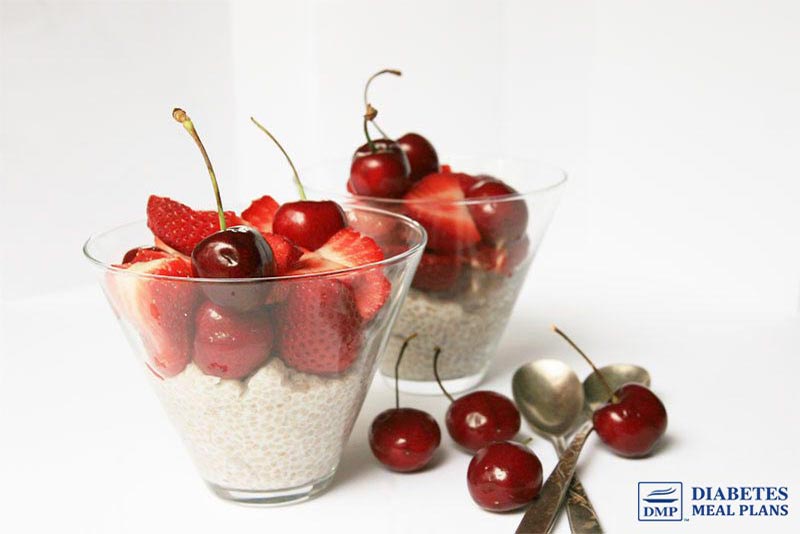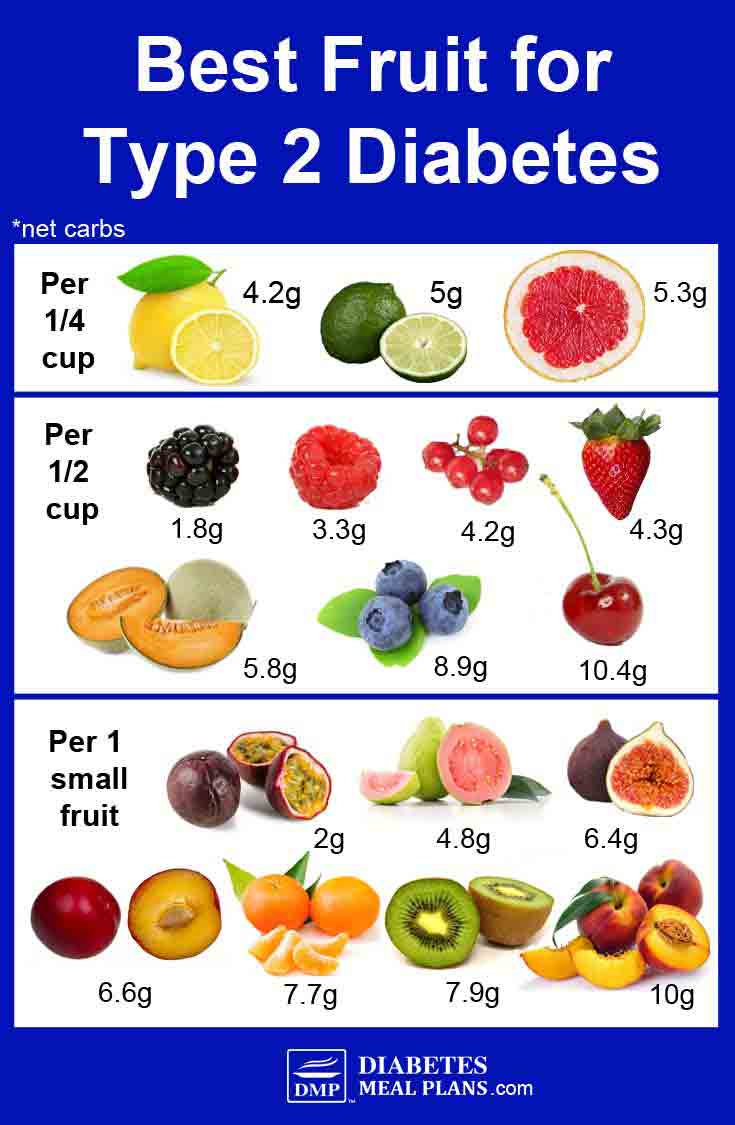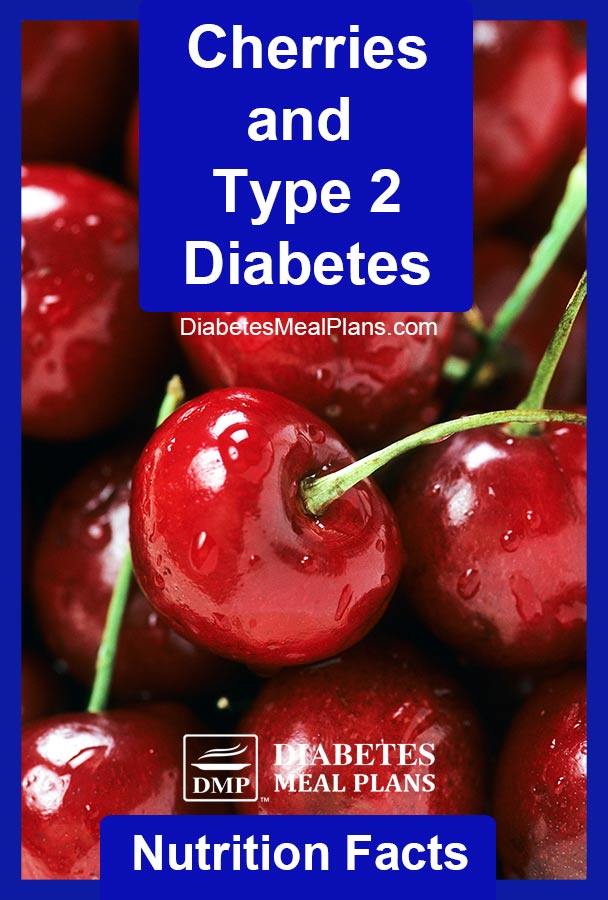Table of Contents[Hide][Show]
These fun-colored fruits taste great, are so easy to eat, and make the perfect summer treat after just a few hours in the freezer.
Though modest in size, cherries pack some major flavor, with the perfect mixture of tartness and sweetness.
So, are cherries good for people with diabetes to enjoy?
Keep reading to find out (we think you’ll like the answer).

What are Cherries?
While it’s common to lump cherries into the “berry” category due to their size, shape, and even their sound-alike name, cherries actually belong to the stone fruit family.
Stone fruit, the group of fruit including peaches, plums, mango, and nectarines are sweet, thin-skinned fruits that house a large pit (or “stone”) in the center.
While some ultra-sugary fruits like pineapple and banana fall strictly in the “no-go” category for people with diabetes, other fruits like cherries can be enjoyed in moderation.
Nutrition Facts on Cherries
As far as sugar content goes, cherries sit right in the middle as “moderate carbohydrate” fruits.
They’re not super low carb like raspberries and blackberries, but they’re not ultra high carb like most tropical fruits, either.
A single cherry contains about 1.2g of carbs.
The serving size we recommend to our readers is a quarter-cup to a half-cup of cherries, maximum.
A half-cup of cherries (about 10 cherries or 77g) contains:
- Total carbs: 11g
- Fiber: 1.5g
- Net carbs: 9.5g
- Protein: 0.7
- Fat: 0.1
A half-cup serving of cherries contains 3.7g of fructose (natural fruit sugar). This is a moderate-to-low amount, especially when compared to a medium sized banana (7g of fructose) or a medium sized apple (13g of fructose).
Because people with diabetes are so sensitive to sugar, especially fructose, it’s a good idea to limit fructose in all forms.
Not only are cherries pretty low carb and low in fructose, but they also have a glycemic index (GI) of between 20 and 25 which is considered “very low” on the GI index. This is great news!
You can see from the image below that cherries fit nicely among other “safe for diabetes” fruits, along with berries, cantaloupe melon, citrus fruits, and others.

Research on Cherry Benefits for Diabetes
While there isn’t a lot of data showing the direct effect that cherries have on diabetes, we do know that cherries are rich in life-giving nutrients like vitamin C, antioxidants, and other anti-inflammatory compounds.
These amazing plant chemicals have a net-positive effect on the body and may have a downstream effect to improve diabetes.
- Cherries contain high levels of antioxidants like beta carotene, lutein and zeaxanthin, as well as vitamins A, B, E, C, and K.
- These compounds have been shown to increase antioxidant capacity in the body, reduce oxidation, and reduce inflammation markers such as TNF-alpha, C-Reactive Protein, and COX-II activity.
However, the jury is still out when it comes to the real-life benefits of cherry consumption in humans. Studies on cherries and cardio-metabolic health have yielded mixed results.
- A review of 29 studies measuring the health benefits of cherries found that cherry supplementation (as a powder, concentrate, or capsule) had positive effects on participants of varied age, body weight, and health status. In these studies, the consumption of cherries:
- Decreased markers for oxidative stress (in 80% of the applicable studies)
- Decreased markers for inflammation (in 68% of the applicable studies)
- Decreased blood pressure (in 71% of the applicable studies)
- Decreased markers for arthritis (in 100% of the applicable studies)
- Decreased exercise-induced muscle soreness (in 88% of applicable studies)
- Improved sleep (in 100% of applicable studies)
- Decreased HbA1c and VLDL “bad cholesterol” among obese participants
- A 2020 study on patients with metabolic syndrome found that tart cherry supplementation resulted in reduced blood pressure, blood glucose, and total cholesterol after just 7 days. The participants in the test group also had an improved respiratory exchange ratio (indicating better oxygenation in the body) by the end of the 7-day trial period.
- However, another study looked at the influence that tart cherry concentrate had on cardio-metabolic risk factors (in middle-aged, non-diabetic adults) and saw no benefit. They found that the cherry supplement had no effect on the participants’ vascular function, heart rate, blood pressure, or inflammation markers.
It’s worth noting that these studies used very concentrated doses of cherry extract, equivalent to someone eating anywhere from 45 to 270 cherries per day!
We clearly don’t suggest eating a mountain of fruit on a daily basis, so don’t expect to see miraculous results overnight from enjoying a half-cup of cherries a few times a week.
However, these studies do show the power that antioxidant-rich foods can have on diabetes and on overall health, so keep eating a variety of vegetables and low carb fruits to see some health payoffs down the road.

Best Types of Cherries for Type 2 Diabetes
While the research doesn’t show cherries to be an instant diabetes cure-all, we do know that cherries are a lower carb fruit option, so they’re OK for people with diabetes. Plus, they’re packed full of nutrients and they taste delicious!
So what’s the best way to eat them?
Let’s start with a warning about the types of cherries to stay away from, and then we’ll move onto the fun part.
Firstly, we recommend staying away from dried cherries (as well as dried fruit in general). Dried cherries contain 32g of carbs for a measly ¼ cup portion!
Secondly, it’s best to steer clear of all fruit juices, including cherry juice. While cherry juice does boast a few potential health benefits, it’s not worth it for people with insulin resistance. Fruit juice is a one-way ticket to a glucose roller-coaster that could last all day!
Finally, say no to maraschino cherries. These festive cherries may look appetizing in a little glass jar, but in reality, they are ultra-sweetened with added sugar, preserved in red food dye and syrup, and bleached free of any nutrients. No thanks!
We recommend that you enjoy fresh or frozen cherries in modest portions, usually ½ cup (about 10 cherries) or less.
Ideas for Eating Cherries
Here are some ways to eat and enjoy cherries:
- A few frozen cherries are the perfect treat for hot weather! Pop them into the freezer for a refreshing summer snack.
- Ripe cherries make a delicious garnish for a fiber-packed dessert like chia seed pudding.
- Cherries can also turn a basic breakfast staple like Greek yogurt into a memorable meal. Mix them into your plain (unsweetened) Greek yogurt to add a touch of natural sweetness.
- For a simple snack on the go, pair fresh cherries with a blood-sugar-stabilizing champion like cottage cheese or a handful of almonds.
Helpful Tip: It’s always best to enjoy your moderate-carb fruits with a fat or protein-heavy food. This pairing causes the natural fruit sugars to be absorbed more slowly in the digestive tract, resulting in a gentler rise in blood sugar.
As with all fruits, stick to just one serving a day. Build the rest of your meals and snacks around low carb staples: healthy fats, meat and fish, fiber-rich vegetables, eggs, nuts, seeds, and low-sugar dairy products.
Cherries and Diabetes FAQ
Now that we’ve gone over all of the above info, let’s shoot some rapid fire questions.
Can diabetics eat cherries?
Yes. Cherries are a good lower carb fruit option but we recommend limiting your portion to half a cup maximum per serve.
Are cherries high in sugar?
Cherries contain about 9g of natural fruit sugar. The total carbs is around 11g, fiber 1.5g and net carbs 9.5g.
How many cherries can a diabetic eat per day?
We recommend limiting your portion of cherries to half a cup maximum per day.
Is tart cherry juice good for diabetics?
No tart cherry juice is not good for diabetics as it is very high in carbohydrates and is pure fruit sugar. Half a cup of tart cherry juice contains 18.4g of carbohydrates and 16.4g sugar.
Do cherries lower blood sugar?
Technically no food can “lower” blood sugar. But a combination of healthy lower-carb foods can lead to lower blood sugar levels overall. Cherries are a good food choice as they are a healthy lower carb fruit option.
Is cherry juice food for diabetics?
No. Similar to tart cherry juice, regular cherry juice is also high in carbs and sugar. For half a cup, cherry juice is around 17g carbs and 15g sugar. In general, it is best to avoid fruit juice as the high carb/sugar content can raise blood sugar levels.

Very helpful! As a long time type two diabetic I am very aware of my condition.